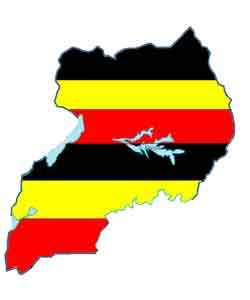in: http://news.yahoo.com/nigeria-senate-approves-anti-gay-marriage-bill-112709602.html
Nigeria's Senate voted Tuesday to criminalize gay marriage, gay advocacy groups and same-sex public displays of affection, the latest legislation targeting a minority already facing discrimination in Africa's most populous nation.
The bill, now much more wide-ranging than its initial draft, must be passed by Nigeria's House of Representatives and signed by President Goodluck Jonathan before becoming law. However, public opinion and lawmakers' calls Tuesday for even harsher penalties show the widespread support for the measure in the deeply religious nation.
"Such elements in society should be killed," said Sen. Baba-Ahmed Yusuf Datti of the opposition party Congress for Progressive Change, drawing some murmurs of support from the gallery.
Gay sex has been banned in Nigeria, a nation of more than 160 million people, since colonial rule by the British. Gays and lesbians face open discrimination and abuse in a country divided by Christians and Muslims who almost uniformly oppose homosexuality. In the areas in Nigeria's north where Islamic Shariah law has been enforced for about a decade, gays and lesbians can face death by stoning.
Under the proposed law, couples who marry could face up to 14 years each in prison. Witnesses or anyone who helps couples marry could be sentenced to 10 years behind bars. That's an increase over the bill's initial penalties, which lawmakers proposed during a debate Tuesday televised live from the National Assembly in Nigeria's capital Abuja.
Other additions to the bill include making it illegal to register gay clubs or organizations, as well as criminalizing the "public show of same-sex amorous relationships directly or indirectly." Those who violate those laws would face 10-year imprisonment as well.
The increased penalties immediately drew criticism from human rights observers.
"The bill will expand Nigeria's already draconian punishments for consensual same-sex conduct and set a precedent that would threaten all Nigerians' rights to privacy, equality, free expression, association and to be free from discrimination," said Erwin van der Borght, the director of Amnesty International's Africa program.
Yet across the African continent, many countries already have made homosexuality punishable by jail sentences. Ugandan legislators introduced a bill that would impose the death penalty for some gays and lesbians, though it has not been passed into law two years later. Even in South Africa, the one country where gays can marry, lesbians have been brutally attacked and murdered.
Nigeria's proposed law has drawn the interest of European Union countries, some of which already offer Nigeria's sexual minorities asylum based on gender identity. The British government recently threatened to cut aid to African countries that violate the rights of gay and lesbian citizens. However, British aid remains quite small in oil-rich Nigeria, one of the top crude suppliers to the U.S.
A spokesman for the British High Commission in Nigeria declined to comment Tuesday, saying officials wanted to study the new version of the bill first.
The bill also could target human rights and HIV-prevention programs run by the U.S. Agency for International Development and the Centers for Disease Control and Prevention in Nigeria, which has the world's third-largest population of people living with HIV and AIDS. A U.S. Embassy spokeswoman declined to comment.
International opinion didn't seem to trouble lawmakers, who at times laughed at each other during the debate. One senator worried the bill would hinder the tradition of Nigeria's Igbo ethnic group in the southeast to have infertile wives "marry" other women to carry their husbands' children. Another said gays suffer from a "mental illness."
Senate President David Mark at one point started laughing when a senator proposed 40-year prison sentences for gay couples who marry.
"Forty years, that is just too much," he said. "He won't come out alive now."
Before the vote, Mark did acknowledge the nation likely would face criticism. However, the lawmaker said Nigeria would not bow to international pressure on any legislation.
"Anybody can write to us, but our values are our values," Mark said. "If there is any country that does not want to give us aid or assistance, just because we hold on very firmly to our values, that country can (keep) their assistance. No country has a right to interfere in the way we make our own laws."
http://news.yahoo.com/nigeria-senate-approves-anti-gay-marriage-bill-112709602.html







 “Here in Switzerland we are a very progressive and tolerant country, which is genuinely gay- and lesbian-welcoming, and we take that very seriously,” said Urs Eberhard, executive vice president of markets and meetings for Switzerland Tourism. “We want to make sure that the welcome our LGBT visitors receive is of the highest possible standard and is in line with our international reputation for industry-leading levels of customer service.
“Here in Switzerland we are a very progressive and tolerant country, which is genuinely gay- and lesbian-welcoming, and we take that very seriously,” said Urs Eberhard, executive vice president of markets and meetings for Switzerland Tourism. “We want to make sure that the welcome our LGBT visitors receive is of the highest possible standard and is in line with our international reputation for industry-leading levels of customer service.  Parada do Orgulho LGBT chega à 20ª edição na Argentina (Foto: Reuters)
Parada do Orgulho LGBT chega à 20ª edição na Argentina (Foto: Reuters)


